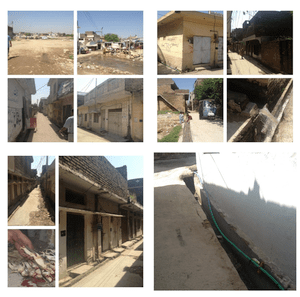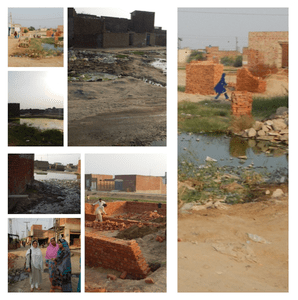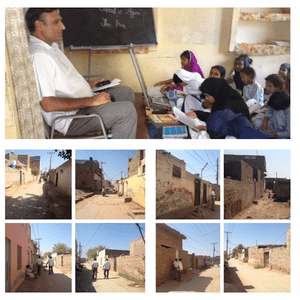DIRTY CANALS. SCORCHING SUN. NO ESCAPE.
FAILING SHELTER CONDITIONS IN PAKISTAN LEAVE CITIZENS WITH FEW OPTIONS FOR RELIEF
Food, shelter, and clothing have been the traditional holy trinity when talking about the basic needs of any population. It is, therefore, conceivable that when one of these elements is inadequate, the conditions faced by people are less than acceptable.
Above: The map above shows all of the research site locations.
In Pakistan, through the Sheltering From A Gathering Storm project, we had an opportunity to explore four communities for which the shelter component failed to provide them protection from increasing summer temperatures, combined with an inadequate supply of electricity. Each community relayed personal accounts of hardships and inadequate conditions whose effects filtered through to all aspects of their lives.
Rawalpindi, Habib Colony (above)
In Rawalpindi, Habib Colony is situated around a dirty canal referred to as a ‘nallah,’ which cuts through the community and services many of the households. Members of the community voiced their frustrations, as the stench from the nallah combined with the mosquitos who use the canal as a breeding ground, make it impossible for inhabitants to enjoy the luxury of opening their windows to increase ventilation or decrease the stuffiness in their homes.
Sadiq Colony, another peri-urban neighborhood in Rawalpindi, faced similar frustrations, even though the cause was somewhat different. Here, an inadequate water supply and an open drainage system created unsatisfactory conditions. The open drains service all the houses in the locality and are polluted by debris and other wastes. The water is supplied to houses through pipes similar to the typical garden hose, which commonly run atop the open drains. These pipes are often broken or damaged by debris in the drains and the polluted water then contaminates the water supply. On our visit to the community during the summer season, we even saw children playing in the drains, as that was their relief and entertainment from the beating sun.
Rehmanabad, Faisalabad, exhibited the most dire conditions that we saw. Here, like Habib Colony, a nallah was the source of much hardship. One woman from the community showed us her young daughter who was approximately three years old and had fallen into the infested pool of water. Her father-in-law, in an attempt to save the child, had dived in after her and rescued her. They both became ill afterwards. This colony, although inhabited by hard working individuals, encounters severe financial challenges. Their homes are in the worst condition that we have seen through the course of this research. Men complained of the mosquitos that made it impossible to entertain or to even sit outside in the evening to enjoy whatever breeze there might be. One man went so far as to say that their conditions were worse than those of the dead in the graveyard. Women, who generally are very sheltered, are forced to wet their clothes and sit outside in order to get some relief.
Multan, Pakistan (above)
Lastly, in Multan, we visited Feroz Colony, where people have traditionally been accustomed to higher temperatures than the other visited sites. Here, however, the people were very much in tune to the fact that the increasing nighttime temperatures were decreasing their ability to adapt to the heat. One person highlighted that before they would sleep outside with electric fans, however, now even the fan was spitting out air as hot as that found on the stoves, making any form of rest next to impossible.
What we realized through the research was that the failure of these peri-urban homes to offer protection against the trends of rising temperatures as projected by climatologists only begins to the skim the surface of the conditions on the ground. Further research and innovation in research and adaptive mechanisms is required in order to completely understand and aid these communities so that the basic needs to which everyone is entitled fulfill the requirements of shelter by offering them comfort and security from the natural forces that prevail both now and in the future.



















